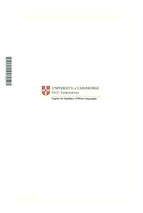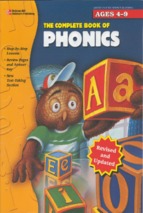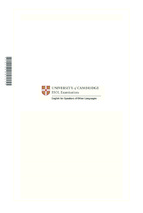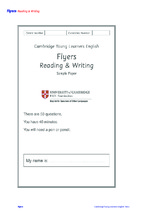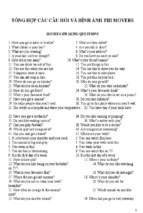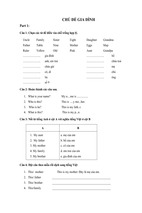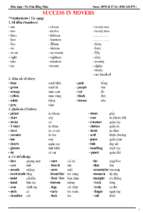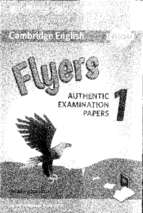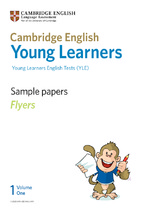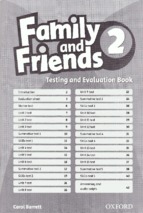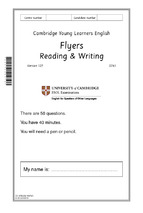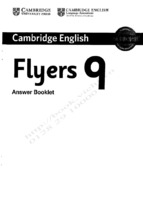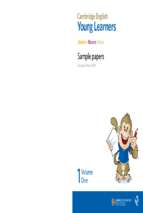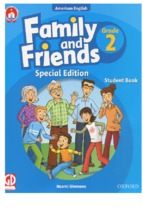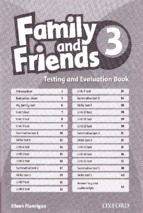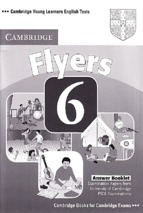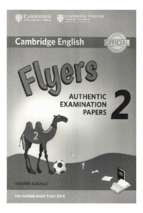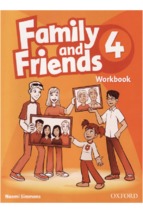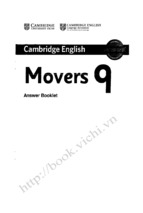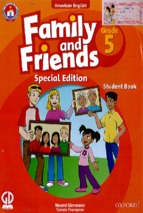Unit
1
It’s headline
news!
Reading
Another first for Bay
City College!
a newspaper report
Page 6
2
1am writing to
say ...
Page 16
Study skills 1
3
This house
believes ...
Page 28
After the Arts Day
a formal letter of
thanks;
an informal letter to
a friend
Editing
Bay City College
debating competition
a discursive text
What career?
Page 38
Archaeology Now
advice, guidance and
information on
a website
Life skills 1
5
Look what they
did!
Page 50
Creating your CV
A Balloon Debate
biographical writing
as autobiography for
class debate
6
In performance
Let’s go live!
a discursive essay
4
Page 60
Study skills 2
7
In suspense
Page 72
8
Moving on
Page 82
Life skills 2
9
Being different
Page 94
10
Changes
Dictionary overview
Escape!
an extract from an
adventure story
Bobbie-Jo’s diary
entries from a diary
Personal statement
Famous Firsts!
an informative
magazine article
Book Reviews
book reviews
Page 104
Study skills 3
Exam strategies
2 Scope and sequence
Reading comprehension
literal questions;
layout questions;
inferential and deductive
questions;
personal response
literal questions;
formal and informal phrases;
letter formats;
inferential questions;
personal response
Grammar
inversion for emphasis and
dramatic effect
Away ran the boy.
inversion with direct speech
“Hello," said Ben.
inversion in conditional
sentences with a formal
context
Should you change your mind,
literal questions;
paragraph analysis;
definitions;
inferential and deductive
questions;
personal response
literal questions;
definitions;
distinguishing advice and
information;
inferential questions;
personal response
concessive clauses with
literal questions;
inferential and deductive
questions;
personal response
inversion of subject and verb
in a formal context
So great was his surprise that
literal questions;
vocabulary and structure
questions;
inferential and personal
response questions
articles with place names in a
town or city
literal questions;
vocabulary, structure and
style questions;
inferential and personal
response questions
m ake/let someone do
literal questions;
vocabulary, style and
structure questions;
inferential and personal
response questions
true/false questions;
vocabulary and structure
questions;
inferential and personal
response questions
literal questions;
vocabulary, inferential
and deductive questions;
personal response questions
Language practice
Punctuation:
ending a sentence;
apostrophes
Language use:
complex sentences
Punctuation:
commas
Language use:
informal writing
I’ll be happy to talk to you.
though, even though,
although,
Though it was sunny, it was
cold.
future perfect continuous
At ten o'clock the men will
have been working for twelve
hours.
Punctuation:
colon, semi-colon
Language use:
simile and metaphor
Punctuation:
direct speech
Language use:
missing words Just starting?
elision She likes the humble as
much as the exotic.
he fell off his chair.
Mayfair, Oxford Street, the
British Museum, the Dorchester
Hotel
something
It made her cry.
We let it go.
Punctuation:
quotations
Language use:
features of formal writing
Punctuation:
brackets and dashes
Language use:
... matter, who/when/
where, etc. + ever
Punctuation:
revision of direct speech
Language use:
o f or possessive ‘s
dare (to), help (to)
1helped her (to) sit.
He dared us (to) go.
passive reporting verbs
It is believed to be an original
painting.
Punctuation:
revision of brackets and
dashes
Language use:
expressions with unusual
tenses
verbs followed by gerunds
and/or infinitives
1stopped running.
1stopped to look.
Punctuation:
revision of colon, semi-colon
Language use:
meanings of get
reported speech: varying
reporting verbs and
constructions
He promised to do it.
She denied it was hers.
Punctuation:
a round-up in brief
Language use:
constructions with
prepositions
Grammar in use
auxiliary verbs do, does, did
for emphasis M/e did enjoy the party.
to avoid repetition Joe works harder than 1
do.
Listening and speaking
Listening comprehension: radio broadcast
true/false/not stated
Individual speaking: an event in the news
Writing features
information and opinion
SB: features and assignment
WB: planning sheet
figurative language for descriptions
Functions of English:
expressing likes / dislikes / preferences
Listening comprehension: dialogue literal
questions
formal and informal letters
SB: features and assignment
WB: planning sheet
Listening comprehension: monologue
multiple choice
Individual speaking: a favourite singer,
musician, etc.
discursive writing
SB: features and assignment
WB: planning sheet
Functions of English:
expressing certainty, probability, possibility
Listening comprehension: dialogue
multiple choice and literal questions
information and advice
SB: features and assignment
WB: planning sheet
discursive writing
SB: features and assignment
WB: planning sheet
faster and faster, bigger and bigger, run and
run, students and students
Listening comprehension: travel programme
literal questions and cloze: listening for
gist and detail
Individual speaking: an interesting foreign
country
Functions of English:
apologising and responding
Listening comprehension dialogues
literal questions
echo questions
‘Anna is ill.' ‘Is she?’
7 never buy sweets.' ‘Don’t you?’
Listening comprehension: film soundtrack
multiple choice and true/false/not stated
Individual speaking: thrillers
story endings
SB: features and assignment
WB: planning sheet
echo tags
Functions of English:
speculating (guessing) about the present
and the past
Listening comprehension: dialogue
literal questions
autobiographical writing
SB: features and assignment
WB: planning sheet
like: It was like a raging bull,
as ... as: as stubborn as a mule
as if: It was as if the sky had fallen in.
as though: ...as though her legs were made
o f jelly.
prepositional phrases
in spite of, apart from, because of, in
common with, in favour of, owing to, instead
of, due to, according to, thanks to, in
addition to, etc.
1
present continuous + always for habitual
actions
Archaeologists are always complaining
about their knees.
articles with geographic names:
the River Thames, Lake Baikal, the Atlantic
Ocean, Mount Everest, the Himalayas, etc.
repetition of comparative adjectives and
adverbs, verbs and nouns
‘That’s cheap!’ ‘It is, isn’t it?'
‘It wasn’t fair.’ ‘It wasn’t, was it?'
discursive writing
SB: features and assignment
WB: planning sheet
uses of dare and need
He daren’t jump.
Did they dare speak?
You needn’t answer.
Does she need to leave now?
Listening comprehension: radio programme: informative writing
multiple choice
SB: features and assignment
Individual speaking: a well-known person
WB: planning sheet
who did something first
zero article before some nouns
Functions of English:
expressing and responding to surprise
and disbelief
Listening comprehension: dialogue
true/false/not stated
He's in hospital.
She works at the hospital.
information and opinion
SB: features and assignment
WB: planning sheet
Scope and sequence
3
i P f n a i College
International College was established in 2005. Some of I
come from Bay City but most of them come from
They are studying at the college because their parents
come from many different parts of the world to work in
around Bay City. The college has over 500 students, aged
12 and 18. The principal is Miss Helen Jackson.
I
i
■
r
Hi. My name’s Todd Olsen and
I’m American. My family came
to Bay City five years ago when
my dad got a job with an oil
company. He’s an engineer.
My name is Gustav
Bind man. I’m 17 years
old and I come from
Vienna in Austria.
j My name’s Lucie Duval and
I ’m French. My father is an
I
airline pilot for Bay Air.
My name’s Rudi Henning and
I come from Johannesburg in
South Africa. My dad runs the big
Golf Hotel just outside Bay City.
I’m Natasha Simms. Everyone
calls me Tasha for short. I’m 18
and I come from Bristol in the
UK. My parents are working as
architects here in Bay City.
My name’s Ramon Acosta.
I ’m 17 and I’m from Mexico.
My parents are both doctors
at Bay City Hospital.
Hi. I’m Vincenzo
Airoldi and I come
from Milan in Italy.
My name is Eva
Zemanova. I come
from Prague,
the capital of the
Czech Republic.
Hello. I’m Marit Ekman and
I’m from Sweden. I ’ve been
at the college for three
years. My dad runs a travel
company and my mum is a
professional photographer.
| Hello. I’m Zafira Karam.
My family is originally
from Lebanon but I
was born in Bay City.
My parents own a
Lebanese restaurant.
It’s one of the best
I restaurants in Bay City.
My name’s Giorgio
Bianco and I’m
Italian, too.
Hi. I’m Liam Devlin and
I’m Irish. My dad works
at the oil refinery.
My name’s Mimi Bon and
I come from Montreal in
Canada. My father is a
scientist and my mother
teaches French here at
the college.
I’m Helen Jackson. I've been the
principal of Bay City International
College since it opened in 2005.
My name is Kurt
Asper and I come
from Switzerland. I’ve
I been a student at the
j college for four years.
It’s headline news!
Start-up
Use WB p5 for your notes.
Q For more than 100 years newspapers have
ry played an important part in informing people about
Q News magazines
cover events in more
detail and often include
features on a specific
subject of current
public interest.
Q The news is
broadcast regularly
on main TV channels.
Some channels run
news continuously.
Journalists send live
reports and viewers
can see events as
they happen.
Do you like to know what is going on around you? Why?
Are you interested in hearing what is happening in your city / country? What local events
and activities do you like to know about?
Do you follow the national news? What kind of news stories are you interested in?
Are you interested in world news? Why? Why not?
R ead in g
• You will read a newspaper report about an Arts Day at the International School.
Has an event at your school ever been reported in a newspaper? What was it?
When was it? Has your school ever been on TV?
V o c ab u la ry
• These words are in the report: highlight, judge, flamboyant, sequence, praise, exquisite.
Look up any you cannot remember or guess.
• Find out what these phrasal verbs mean: come up with, pull out, step in, stand in for.
G ra m m a r
• You will look at inversion of subject and verb. What is the subject verb order in these
sentences? Here comes the bus. The bus is coming.
L a n g u a g e p ra c tic e
• Punctuation: ending sentences. Apart from a full stop, what other marks
end a sentence?
• Using apostrophes. Think of two different reasons for using an apostrophe.
• Language use: You will look at compound sentences and complex sentences. Think of
five conjunctions that can join two main clauses in a compound sentence.
often see live videos of important
events or short clips taken by mobile
phones and posted on the internet.
G ram m ar in u se
• You will hear a discussion about the music performance at the festival.
• You will study how auxiliary verbs can be used
for emphasis: / really did enjoy that film!
to avoid repetition of the main verb: Leo speaks French better than Joe does.
What does Joe do?
Listening an d s p e ak in g
• You will listen to a news bulletin. Find out what a bulletin is.
• You will prepare a presentation on a recent news event. List three different
events you have heard about recently, either local, national or international.
C o n versa tio n fo c u s
Kurt is using the computer in the library when Liam arrives.
1 Listen to their conversation.
2
Read the questions on Workbook page 5. Listen again and answer
the questions.
3
Talk in a group about how you follow the news. Use the photos and
information on this page to help you, as well as any of your own ideas. Ask:
Do you re a d ...?
Do you watch / listen ...?
Say: I follow the news ... I use ... I never...
W riting
• You will write a news report of a performance day at your school. Think of three
different kinds of performance that could be presented to an audience in school.
rcupic iisicm tu rduiub muoors,
outdoors and in their cars. Many radio
stations give the news in brief every hour
and have longer news programmes^too.
Q Mobile phones receive
information from the
internet. With a mobile
phone you’re never out of
touch. You can keep up
with the news, anywhere,
any time.
(
I
fjjjfl
Bay C ity News
Another First for Bay City College!
by Jago Matarian, Arts correspondent
i
In July I reported on the first
festival. It was a huge success for
Bay City International College and
the student organisers. Now the
students have come up with another
new idea: a DVD containing all the
main festival events and more.
2
The disc was launched yesterday
during a special Arts Day in
the College’s Great Hall and
received a tremendous reception
from an enthusiastic audience.
Headmistress, Miss Helen Jackson,
told the audience how proud she
was of what the students had
achieved in putting on the festival.
She believed that the festival had
exceeded people’s expectations
and now the DVD would make the
us, but they came and performed it
injured ballerina and dance with
festival events available to an even
with us and it was recorded for the
the company on the last night of
wider audience.
DVD. That’s another first!’
the festival. Now she’s on the
The impressive dance programme
DVD, too!’
3
The festival music programme
4
attracted huge audiences, especially
included more than 150 performers
The River Boys’ open-air concert
from 15 different countries
on the first night when more than
performing traditional dances
1,000 people crammed onto the
from around the world. The DVD
college football pitch to watch their
gives a flavour of all of these. For
show on the outdoor stage. Video
me, the highlight of the dance
clips from this spectacular opening
events was the ballet performance
event have been on the college
which ended the festival and the
website for several weeks but now
whole of the final act is included
the complete concert is on the DVD.
on the disc. Festival organiser
Not only that, but there’s an extra
Tasha Simms said, T h e college is
special track. Music student Gustav
lucky to have some very talented
Hindman explained, ‘I thought
dancers among the students and
their music was so amazing that
Eva Zemanova, who comes from the
I contacted the group and asked
Czech Republic, was able to put us
if they would write something for
in touch with a professional dance
the school orchestra. We play a lot
company from her country. We
of classical music but we need to
were delighted that they came and
expand our repertoire, of course.
very pleased for Eva that she had
Not only did they write a song for
the opportunity to stand in for an
g
Reading: a newspaper report
Bay City News
§J
The rare Chinese vase that Professor Barnes
uncovered 20 years ago.
5
we’ll definitely come to the
A sequence of photographs by art
Anthony Holt, with whom she was
student Lucie Duval is an unusual
a student at London University
and striking feature of the DVD.
many years ago. He told Miss
She documented visitors’ reactions
Jackson that he would be thrilled
to the sculpture garden that was so
to replace Miss Brodie. As well as
popular with everyone, especially
the author reading from his best-
any of them will volunteer again.
the children, who were encouraged
known title, Over the Edge, the
Up went the hands, without a
to touch the sculptures. She also
DVD has an exclusive interview
moment’s hesitation. I was very
photographed the festival as a
with him about his latest novel,
whole and, judging by those that
which is soon to be published.
touched by their enthusiasm. So
there it is! There is our decision!
were exhibited at the launch, the
DVD has some remarkable pictures
Rudi Henning told me, ‘Anthony
Ithink we’ve started a tradition,’
Holt is great. He’s a real inspiration
she added, ‘and there are many in
of events ranging from children’s
to us all and very modest about
Bay City who will applaud that.’
puppet shows to the stunningly
his immense success. All of us
beautiful artefacts shown by
on the festival committee were
Professor Barnes in his talk on Art
tremendously grateful to him for
stepping in at the last moment.’
and Archaeology, which so many
people found fascinating.
6 One disappointment had been
Will there be another festival
next year? Miss Jackson said,
‘I’ve already asked the students if
7 At yesterday’s College Arts Day
there was nothing but praise for
the cancellation of Eliza Brodie’s
the students who had organised
appearance. The flamboyant,
the festival. ‘They showed a lot
best-selling author pulled out
of imagination in their choice of
at the last moment following
events,’ said one visitor. ‘Brilliant
the million-dollar offer made to
fireworks,’ said another. ‘We
really did enjoy everything,’ one
her by a Hollywood studio for
next festival.’
8
her book Himalayan Adventure,
elderly lady told me. ‘My husband
now being filmed on location in
likes music more than I do, but I
India. Fortunately, the literature
thought the Incredible Golden Jazz
programme was rescued (and
Band was delightful.
in my view, improved) by Miss
And the chamber orchestra from
Jackson. She got in touch with the
London was just exquisite. We’re
well-known science fiction writer,
buying the DVD and
Reading: a newspaper report
9
Reading comprehension
1
Scan the newspaper report to find the answer to these questions.
1
What did Miss Jackson tell the audience at the launch?
2
How many people watched The River Boys?
3
Where was the concert held?
4
What did Gustav ask The River Boys to do?
5
How many dancers were involved in the traditional dances?
6
How many countries were represented?
7
Where did Eva come from?
8
Who took the photos of the sculpture garden?
9
What was Professor Barnes’ talk about?
10
What kind of books does Anthony Holt write?
Discuss these questions about the way the report is written.
1
How is the article laid out?
2
3
What tells you what the article is about?
How is it divided up?
4
Which paragraphs tell the reader about
a Lucie’s photos
b what visitors to the Arts Day said
c
the music programme
d whether there will be another festival
e the replacement of Eliza Brodie
f
5
6
the dance programme.
What key information does the firs t paragraph give?
How do you know what the pictures show?
Complete the meanings of these phrases without using the hyphenated adjective in your answer.
Use your dictionary if you need to.
1
best-selling author: an author who
2
open-air concert: a concert which
3
well-known author: an author who
4
best-known title: the title of a book which
Discuss your answers to these questions in pairs or groups.
1
Are you surprised that Gustav asked The River Boys to write a piece
2
Why do you think that people were fascinated by Professor Barnes’
of music especially for the school orchestra? Why? / Why not?
talk on Art and Archaeology? Think of several re a so n s.__________
Remember that an informative talk has:
Why do you think the Hollywood film offer caused Eliza Brodie to
pull out of the festival?
• content (the information that the
person gives)
What opinion do you think the writer has of Eliza Brodie and Anthony Holt?
• form (the methods by which the
Why do you think students didn’t hesitate to volunteer to organise
another festival? Think of at least two reasons.
information is presented)
• style (the way in which the
What do you think?
1
information is presented)
Do you agree that the festival DVD was a good idea? Why? / Why not?
2
Which of the DVD items mentioned in the article would you like to watch? Why?
3
If you were a student at the International School, would you volunteer to help with the next festival?
Why? / Why not? What would you volunteer to help with?
I *10 Reading comprehension: literal questions; layout questions; inferential and deductive questions; personal response
Read.
Todd, Tasha and Lucie were sitting in the school library waiting
for the other members of the festival committee. Suddenly, they
heard running footsteps in the corridor outside and into the room
burst Ramon, waving a newspaper in his hand. “ Look at this!" he
exclaimed. “There’s an article about our DVD in the Bay City News.”
“What does it say?” asked Lucie.
“They love it!” Ramon replied.
Before they could read the newspaper article, in walked Miss
Jackson. “What a marvellous report!" she said. “ Well done,
everyone! I’m so proud of you!”
“We’ve been talking about this year’s festival,” said Todd.
“We can’t wait to get started,” added Tasha.
“ Excellent!” Miss Jackson replied. “ I’m ju s t going to a meeting
with the school governors,” she continued. “ I'll tell them the good
news.” And, smiling broadly, off she went.
Answer the questions.
Use your own ideas to complete the sentences.
Invert subject and verb. Try not to use say.
1
Why were Todd, Tasha and Lucie in the library?
2
Was Ramon excited? How do you know?
1
3
Why is Miss Jackson proud of the students?
2
4
Why was she smiling when she left?
3
“ Where is your homework?”
4
“ Sh! The baby’s sleeping.”
5
“ Please, help me. Please!”
6
“Oh! What a surprise!”
Change the sentences as in the example.
1 The horse galloped away.
“Goal!” “Goal!” shouted the crowd.
“ Help!”
Away galloped the horse.
2
The balloon rose into the sky.
3
The lion sprang onto the zebra.
4
The eagle swooped down.
1
5
The crowd streamed out of the stadium.
6
The children stood there.
before the verb:
The boy ran away.
Word order: inversion of subject and verb
The subject of a sentence usually appears
The horse le a p t over the fence.
Choose your own verbs to complete the
sentences.
If the adverb dr adverbial phrase of place comes
first in the sentence, the subject and verb can be
1
Up ... the mountaineers.
2
Off ... the athletes.
3
Down ... the rain.
Over the fence leapt the horse.
4
Into the pool ... the children.
5
Over the mountains ... the birds.
There is no inversion if a pronoun is used:
Away he ran.
6
Onto the pitch ... the fans.
Over the fence it leapt.
inverted:
Away ran the boy.
Putting the adverb or adverbial phrase at the
beginning makes the sentence more dramatic.
2
In direct speech the subject and verb of the
reporting phrase can also be inverted when it
follows the direct speech:
“Wait a minute!” th e boy said.
“Wait a minute!” s a id the boy.
There is no inversion if a pronoun is used:
“Wait a minute!” he said.
Grammar: word order (inversion of subject and verb) 11
Language practice
' Ig?',;.
A Punctuation
B Language use
1 En ding se n te n c e s
C o m p le x se n te n ce s
There are three ways to end a sentence.
You already know about compound
• full stop: In July I reported on the first festival.
sentences: two main clauses joined by a
• question mark: Will there be another festival?
conjunction, e.g./ like films but I hate TV.
• exclamation mark: ‘That’s another firs t!’
1
When is the next festival
The sculpture was popular
2
You have learned about complex sentences:
It was amazing
a main clause with at least one subordinate clause,
A subordinate clause gives extra information.
Underline the main clause and put the extra
information in brackets.
If something contracts, it gets smaller.
Contractions are words that have been made
1
smaller by missing out letters. An apostrophe is
Some complex sentences have two main
used instead of the missing letter[s].
clauses joined by a conjunction and one or more
He's a real inspiration.
Add the missing apostrophes to these words.
2
subordinate clauses.
1
theres
2 shes
3 well
4
weve
5 couldnt
6 its
She also photographed the festival as a whole and, ju d g in g
by those that were exhibited at the launch, the DVD has
Write the contraction of these pairs of words.
they are
2 who had
3
I have
4
shows to the stunningly beautiful artefacts shown by
Professor Barnes in his talk on Art and Archaeology, which I
so many people found fascinating.
These apostrophes are used to show who owns or
has something. If the owner is singular, use ’s:
1
What did Lucie photograph?
the College’s Great Hall
2
When were some of her photos exhibited?
Anthony Holt’s book
Write these sentences correctly. Find the owner
and add the apostrophe.
1
The com m ittees hard work paid off.
2
Anthonys new book will soon be published.
3
Lucies photographs were stunning.
If the owner is plural and ends in s, use s'.
2
3
How are the pictures on the DVD described?
4
What different things did Lucie photograph?
5
Who showed the artefacts and when?
6
What did people think of his talk?
Do the following to the sentence from the report.
1
2
1
The visitors enjoyment was obvious.
2
The students new idea is a DVD.
3
The dancers performance was amazing.
If the owners are plural but do not end in s, use's.
exceeded people’s expectation
3
Write these sentences correctly. Find the owners
and add the apostrophe.
1
The childrens favourite was the circus skills.
2
The reporter asked for peoples opinion.
I
Circle the conjunction. Underline two main clauses. I
Put the clauses with extra information in brackets.
The River Boys’ open-air concert
Write these sentences correctly. Find the owners
and add the apostrophe.
I
some remarkable pictures ranging from children’s puppet I
Eva is
3 A p o s tro p h e s o f p oss e s s io n
2
I
1
Read this sentence from the newspaper report and
answer the questions below.
1
1
I
e.g. / like films, especially if they have lots of action.
2 A p o s tro p h e s in c o n tra c tio n s
We’re buying the DVD
|
Underline the main clauses and circle the
conjunction.
Finish each sentence with the correct
punctuation mark.
3
^
I
Rewrite the sentence. Use as many sentences as y o fl
like. Include the same information.
3
Compare your sentences with the original sentence. I
4
Read your sentences and the original sentence a lo u d
How many words have you used?
Discuss these questions.
a Which is easier to understand?
b
In your opinion, which sounds better? Why?
c
Why did the reporter choose to write all the
information in one sentence?
1 2 Language practice: punctuation (full stop, question mark, exclamation mark, apostrophes): language use (complex sentences)
grammar in use
Listen and read.
Tasha:
I never get tired of w atching The River Boys.
Todd:
Rudi:
You did such a great jo b film ing it, Tasha.
What an awesome night!
Tasha: The crowd did enjoy it, didn’t they?
Ramon: Look! There we are in the front row! We do look funny!
Lucie:
The drum m er’s brilliant. And to think he was a student
at our school, too.
Rudi:
W hat? You d idn’t tell me that!
Lucie:
I did tell you. You ju s t weren’t listening - as usual.
Todd:
Oh! Hello, M iss Jackson! Is som ething the matter?
Miss Jackson:
Hello, everyone. I’ m afraid so, Todd. I’ve ju s t
been speaking to the governors and I’ m sorry
to say it’s bad news. While the festival was a h u | | artistic success, it does
appear th at financially it was not. We made a loss and the governors are
Rudi:
insisting th a t this money m ust be paid back to the college.
How on earth can we do that? Is it a lot o f money?
Miss Jackson:
They’re also saying th a t next sum m er’s festival m ust make a profit. If not, all
future festivals will be cancelled. Now, I want the arts festival to continue as
Lucie:
much as you do so you need to think very carefully about what I’ve ju s t told you.
Two m inutes ago I was feeling really happy but now ...
Cover the dialogue and answer the questions.
1 What are the students watching?
5
Use do, does, or did to complete the sentences.
2
What do you know about The River Boys’ drummer?
1
2
I want the festival to continue as much as you ....
Jane works harder than her s is te r....
3
What did the governors tell Miss Jackson?
3
He went to the same school as his fa th e r....
4
What must the festival committee do?
4
My brother likes sport more than I ... .
5
Will there be a second festival?
5
6
Will there be a third festival?
6
Change the sentences as in the example. Use do,
does or did to emphasise the verbs.
1
The River Boys play well.
Did you enjoy the concert as much as we ... ?
The students don’t speak English as well as their
teacher ....
You can use the auxiliary verbs do, does and did
1 to give emphasis to a verb:
The River Boys do play well.
2
The audience enjoyed the concert.
3
Miss Jackson looks worried.
4
The governors make harsh decisions sometimes.
5
The festival achieved artistic success.
6
Lucie feels miserable.
We d id enjoy the party!
= We enjoyed the party very much.
He does com plain a lot.
= He really complains a lot.
2
A: He didn’t work in New York.
B: You’re wrong. He did work in New York.
Use do, does or did to contradict the statements.
1
2
to contradict a previous negative statement:
He doesn’t understand.
Or: You’re wrong. He did.
He does understand.
A: You don’t understand.
Gustav didn’t enjoy the concert.
B: I do inderstand! Or: I do!
3
to avoid repetition of a verb:
3
The festival didn’t make a loss.
4
The students don’t want another festival.
Jane works harder than her brother does.
5
The drummer doesn’t play well.
I
6
You don’t listen.
You speak French better than we do.
got the same mark that you did.
Find examples of 1, 2 and 3 in the dialogue.
Grammar in use: auxiliary verbs do, does and did
13
Listening and speaking
L istening c o m p reh en s io n
1 f
Listen to part of a broadcast from City Radio
and answer the questions.
1
Who is Dave Fox?
2
What is Samatha James’s job?
3
Who is Andy Barton?
4
Can you name five items from the news bulletin?
2
Listen again and write T (true), F (false)
or NS (not stated).
1 A serious fire broke out on the beach............
2
The fire damaged all the apartments in the
block.............
3
4
The cause of the fire has been established............
There is only one shopping centre in Bay City............
5
Many people drove to the opening of the shopping centre............
6
Samantha James mentions three sports in her report.
7 The Symphony Orchestra is going to play more than one concert in Bay City............
8 Tickets for the first concert have sold out.............
9
Dave Fox went to the arts festival at Bay City International College..............................................................
10
11
Samantha James prefers classical music to pop.............................................................................................
It might rain later today............
12
Bay City Radio broadcasts News Extra five times a day............
3
Compare your answers in groups. Correct the false statements.
4
Talk about the statements which you marked NS (not stated). Why did you choose these answers?
5
Talk about it.
• Which items of news did you find most interesting? Why?
• If you could go to either the football match or the concert, which would you choose? Why?
Individual speakin g
You are going to talk about an event which is in the news now or
which has been in the news recently.You can choose an international,
national or local event.
Preparation in groups:
1
Do you think it is important to follow the news? Why? / Why not?
2
How do you follow the news? (radio / TV / online / newspapers / other?)
3
What events have been in the news recently?
Think about a) international events, b) national events, c) local events.
4
What do you know about the events you listed in a), b) and c) above?
Now tell the rest of the class about your discussion.
R oad
[CLOSEDl
14
Listening and speaking: listening comprehension (radio programme); true/false/not stated; individual speaking (an event in the news)
iting features
N ew sp ap e r rep o rt
You have read Another First for Bay City College, a newspaper report about the festival held at the
International School. The reporter has included inform ation about the festival, the o pin io n of the
organisers and audiences, and his own im pre ssion of the event.
►
C h ecklist
Headline
A headline must catch the reader’s eye and make him or her want to read on.
What is the headline of the newspaper report on pages 8 and 9?
Why do you think the headline doesn’t say what the ‘First’ is?
►
By-li
The by-line is the name of the person who wrote the article.
Who wrote the article?
What other information does the by-line give you?
►
Opening paragraph
The headline has made readers want to read the article. The opening paragraph must keep
readers interested and let them know what the article is about. It gives very specific information.
What is it about?
When did it happen?
Where dicK-it happen?
Who was involved?
Newspapers report facts, e.g.
Not only did they write a song for us but they came and performed it.
They may include statistics, e.g. more than 1,000 people ...
Find two examples of fa cts and statistics in the report.
The reporter has not written about the festival in the order in which things happened. He
has grouped together facts and opinions about events in the festival in each paragraph, e.g.
Paragraph 3: music in the festival.
Briefly say what each paragraph in the report is about.
►
Opinions
Reporters often include what people think about what has happened.
They quote the words actually spoken, e.g.
‘We really did enjoy everything,’ one elderly lady told me.
They report what people think about what has happened.
Headmistress, Miss Jackson, told the audience how proud she was ...
They express their personal opinion, e.g.
For me, the highlight of the dance was the ballet performance ...
Find another example of a quote, a reported statement and a
personal opinion.
►
Past tenses
Most newspaper reports are written about things that have happened.
They are written in past tenses, e.g.
I reported on ...
The disc was launched ...
Find three examples of past tenses in the report.
►
Captioned illustrations
Illustrations - photographs, diagrams, maps, etc., help the reader to
understand what the report is about.
Photographs are often captioned, e.g. Festival fireworks
Find another example of a captioned photograph in the report.
z'
W riting as sig n m e n t
........ .
You have read and discussed a newspaper report about the festival at Bay City College.
You are now going to imagine that your school has held a ‘performance day’ with music,
dance, readings, sports displays, etc. Write a newspaper report about the performance day.
Writing features: newspaper report
15
I am writina to
Start-up
Q Letter writing is a valuable skill.
For centuries it was the only form of
communication between people at a
distance. Educated people spent hours
every week writing letters, which took
several days to reach the recipient.
e best letter writers were
d for the quality of their
writing. Many people kept all
the letters they received and
important collections exist.
Some were written by ordinary
people and give details of daily
life in the past.
Q The letters of
royalty, politicians
and famous authors
tell us their thoughts
and feelings. Extracts
are often included in
biographies. They give
insight into why and
how significant events
happened.
Have you ever written a letter to somebody? Who was it? What kind of letter was it and
why did you write it?
Have you ever received a personal letter? Who was it from? Did you keep it?
Which form of communication do you use most, email or text messages?
What do you use them for?
What do you think are the main differences between letters, emails and texts?
R eading
• You will read two letters: one is formal and one is informal.
Think of a reason for writing a formal letter. Think of a reason for writing an
informal letter.
V o ca b u la ry
• These words are in the letters: contribution, conservation, assume, intrigue, amateur.
Circle any you cannot remember or guess. Look them up.
• Find out what these phrases mean: treasure trove, base camp, field trip, art form.
G ram m a r
• You will study inversion in conditional sentences. What does inversion mean?
What parts of the sentence do you think could be inverted?
L a n g u a g e p ractice
• Punctuation: the correct use of commas. Think of two occasions when commas are
needed in writing.
• Language use: informal writing. Think of two features of informal writing.
□ Texts, informal emails and
social networking messages are
usually brief with short forms and
abbreviations. Not much attention
is paid to the quality of the writing. I
G ram m ar in use
• You will hear a discussion about buying tickets for a concert and paying by credit card.
What is a credit card? How is it used? Who can have one? What are the advantages and
disadvantages of paying by credit card and not in cash?
• You will study figurative language, which describes what something is like.
j
Think of an ending to this sentence: The setting sun glowed in the western sky like ...
Listening and s p eakin g
• You will practise expressing likes, dislikes and preferences. Think of one thing you
like a lot and one thing you absolutely can’t stand.
• You will listen to a conversation about an incident that upset Lucie on the way to
school. What incident do you think that might be? Think of two ideas.
C onversatio n fo c u s n f l l
Gustav is tidying up in the music room before school starts when Florence arrives.
1 Listen to their conversation.
I
I
2
!
3
I
|
I
Read the questions on Workbook page 15. Listen again and answer the questions.
Talk in a group about letters and other ways of sending communications to people.
Use the photos and information on this page to help you, as well as any of your own
ideas. Ask: Do you send letters / emails / texts? Say: / write . . . I think ...a re better
than ... I don't like ...
W riting
f • You will look at the features of writing a formal and an informal letter. Which of the two
of these do you think is easier to write? Why? Give at least two reasons.
Q Important information
is still sent by letter.
People write formal
letters for business, for
applying for a job or a
course. A good quality
of formal writing is
essential, whether the
letter is sent by email or
by post.
I® After the Arts Day
314 Ocean Avenue
A p t 109
Bay C ity 99671
2 2 nd O cto b e r
Professor D Barnes
D e p a rtm e n t o f A rch a e o lo g y and A n c ie n t H isto ry
U niv e rs ity o f th e N orth
New castle
Dear P rofessor Barnes,
I am w ritin g to tha n k you v e ry m uch fo r allowing us to reproduce th e photo g ra p h s o f y o u r A n cie n t
British trea sure tro v e on o u r fe s tiv a l DVD. As these a rte fa c ts have never been publicly displayed,
we are m o s t g ra te fu l to you fo r allow ing us to include these unique im ages. Your c o n trib u tio n has
made o u r DVD o f special in te re s t to m any people.
We have ju s t held an A r ts Day in th e college during w hich th e DVD was launched. One o f th e
e xhibitio ns s e t up fo r th e day was a p h o to g ra p h ic ga lle ry w ith p ictu re s taken by Lucie Duval. The
c o lle c tio n included som e o f th e o b je c ts you showed during y o u r ta lk on A r t and A rcha e o lo g y and
th ese are on th e DVD. I am sending you th e fe stiva l DVD w ith th is le tte r and I hope you will agree
th a t Lu cie ’s p h oto g ra p h s enhance th e fin e q u a lity and b e a u ty o f th e o b je c ts them selves.
I am also sending a new spaper c u ttin g o f a re p o rt on th e A rts Day, w hich I hope you will find
in te re s tin g . As you will see fro m th e re p o rt, m any people m ade v e ry p o sitive co m m e n ts ab o u t
th e la s t fe s tiv a l w hich we fo u n d v e ry e n couraging. We are keen to organise ano th e r fe stiva l fo r
ne x t year and we are already th in k in g o f how we can make it bigger and b e tte r. We are planning to
produce a fe s tiv a l prog ram m e, illu s tra te d in fu ll colour, giving in fo rm a tio n a b o u t all th e events and
c o n trib u to rs . A s one o f o u r lite ra tu re events, we are th in kin g a b o u t early w ritin g and hand w ritin g
as an a rt fo rm .
On beh a lf o f th e fe s tiv a l c o m m itte e , I w o uld like to ask you if you w ould be w illing to co n trib u te
to o u r n e x t fe s tiv a l. We u n de rsta nd th a t you have a special in te re s t in early fo rm s o f w ritin g fro m
around th e w o rld and we w ou ld like to invite you to give a ta lk on th a t su b je ct. We w ould also like to
ask you if you w o uld w rite an in tro d u c tio n to th e fe stiva l program m e. As a main c o n trib u to r to our
fir s t fe s tiv a l, we feel sure th a t people w ill be in te re ste d to read y o u r th o u g h ts a b o u t th e
second one.
Should yo u feel able to re spond to o u r requests, we w ould
be d elig h te d to hear fro m you. T hank you again fo r all your
s u p p o rt and e nco ura ge m en t d uring th e last year.
Yours sincerely,
/slc&aSho. Si/y?/yiS
Natasha Simms
18
Reading: a formal letter
56 Central Street
Apt 2
Bay City 99604
24th October
□^sending this letter to the Panda Conservation base camp
r::r
fJ <3p0nsoring
313 I thought you’d like to know that w e’ve created a DVD of
copy! Tasha, efficient as ever, has sent one to
the absolutely sensational fireworks, e wer
clip of the display on the disc. I hope you 11be a
over by hi^generosity. Thrae’s a great vide,
■
assume you’ve got laptops at the base
,
f herbest .It looks as
if a giant hand has scattered fistfuls of coloured lights acr° ^ ^
photo of a panda. Knowing how rare they are n o w . s e w ^ ^
concerned that you might not have seen
^
^
^
^
e o oo
camp, in case yon haven,, Lncie printed off one of her
^
any. She thought you could pm this one UP °
■
Tve developed quite a passion for pyrotechnicssmc
summer by the way. I suppose there are
r d ^ lfte t o
whole factories in China that are devoted to pro ucmg a
mind on chemistry so that I
^
know how they are designed and made. I know I m^
z
: : r
r
- !e ”
r
h
; r
r —
^
=
r
r
=
^
a
p
off the enclosed
a
upl) but I’m intrigued by the colours and
r
, . P
h
—
:
again! W e’re thinking about including writing a
^ ^
meeting and the others took a
some c a lh g r e ^ ^ a c t ^ iy being donerthat'woulcTbe even better. We're going to see if w e can get Arabic
^ ^ p ^ b e t ^ ^ ^ o r T w d t ^ ^ b ^ ^ r e v ^ t o n ^ c w . We've got a test at the end of the week - some things
never change!
U
Best wishes from everyone here,
J p rfd
Reading comprehension
1
Answer these questions.
1
Where does Tasha live?
2
Where does Professor Barnes teach?
3
What photos did Professor Barnes allow the students to include on the DVD?
4
What do the students want the second festival to be like compared
5
What special interest does Professor Barnes have?
6
Where did Todd send the letter for Lee to?
7
What does Todd expect Lee to use to look at the DVD?
8
How does Todd describe Lucie’s photo of fireworks?
9
What has Todd become very interested in?
10
2
to the first one?
What calligraphers are the students hoping will be at the next festival?
Read the phrases and write F (formal) or I (informal). Check in the letters on pages 18 and 19.
1 We are keen to organise ...
2
... decided to take the plun ge....................
3
I would like to ask you i f .....................
4 We understand that you have ...
5 Could you let us know ...?
6
... since the summer, by the way ...
7
Should you feel able to resp on d ....................
8
I’d really like to k n o w .....................
9
I know you’ve always wanted to ...
10
... which I hope you will f in d .....................
11 We would also like to ask you i f .....................
12
3
... I’ve enclosed your free copy!
Discuss what is the same and what is different
in the form of the two letters.
Think about:
• the sender’s address
• the date
• the recipient’s address
• the greeting
• the body of the letter
• the closure of the letter
4
Discuss your answers to these questions.
1
In what ways do the students plan to improve tl
printed festival programme?
2
Do you think Professor Barnes would make a ta
writing as an art form interesting? Why? / Why
3
Do you think demonstrations of calligraphy would be more
interesting? Why? / Why not?
4
5
Do you think Todd would like to visit China? How do you know?
What do you think?
1
The students are planning a programme in full colour with information about the contributor and events.
2
What do you think Professor Barnes’ reply to Tasha will be? Why do you think he will give this reply?
3
Do you think the next festival will be bigger and better? Give reasons for your answer.
What do you imagine the firs t festival programme was like?
2 0 Reading comprehension: literal questions; formal/informal phrases; letter formats; inferential questions; personal response
- Xem thêm -

